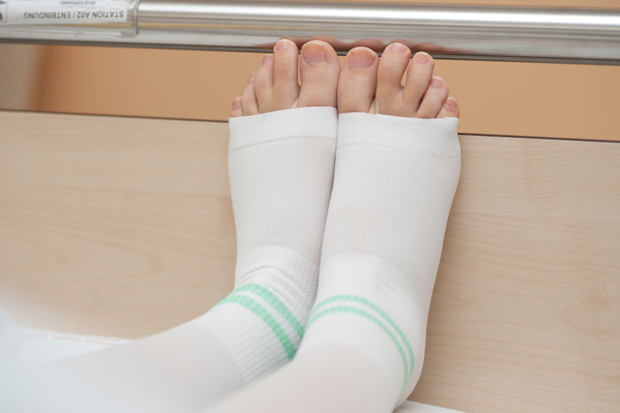There’s some journalistic research you’d really never do by choice. Spending four days in an NHS hospital with a life-threatening pulmonary embolism, for example.
Unfortunately it was out of my hands. I fell off a horse, one thing led to another, and suddenly there I was, lying in what I imagine is a reasonably typical NHS ward being tended by all those multi-ethnic nurses and hard-pressed doctors you read about in the newspapers but rarely encounter yourself because in order to do so you have to be quite seriously ill.
So: what have I learned?
First, that it’s not as bad as you’ve long feared, especially not for anyone hardened by the experience of the military, prison or — in my own case — being at an English prep school in the 1970s. Yes, it’s all a bit spartan, but the staff from the porters and cleaners to the consultants were a delight, and I grew very fond of my multinational assortment of nurses from Poland, Zimbabwe, Portugal, Ghana and south India, who couldn’t have been harder-working, jollier, more competent or more caring.
Also, the routine and the retro ambiance can become weirdly seductive: the morning clean-up team who’ll either shave and wash you in bed or give you the towels and shower gel to do it yourself (NHS razors are horribly blunt, though); the jolly dinner-lady type who comes round and round with tea, forgetting every time that you don’t take sugar; the endless blood-pressure and temperature checks; the dispensation of your medicines in those little plastic cups; the school food; the hideous but oh-so-practical, one-size-fits-all pyjamas. If you were healthy you’d be appalled by everything: the noise, the light, the smell, the Soviet basicness. But when you’re ill, there’s almost nowhere you’d rather be and you feel in very safe hands.
That’s the good side. Now the bad — and it’s so bad I’m surprised it isn’t more of a national scandal. We read a lot about a service stretched to breaking point but what few of us grasp — I didn’t until I saw it myself — is perhaps the main contributory factor to this: bed after bed occupied by elderly, often Alzheimer’s-afflicted patients who simply don’t belong in wards designed to treat acute, short-term conditions.
I don’t mean to be heartless here. Clearly we need to find some way of ensuring that our elderly, especially those with no family to care for them, live out their twilight years free from misery and discomfort. But the place for these people is a dedicated home run by carers, not an expensive-to-run NHS ward with highly trained staff and valuable equipment designed primarily for emergencies.
A pulmonary embolism isn’t the worst thing that can happen to you but it’s pretty bad. On my first night, as I lay wracked with pain that sometimes penetrated even my morphine delirium, I could not but be conscious of the skeletal, rambling old geezer opposite me spraying his entire bed area in explosive diarrhoea.
Bright lights on for at least an hour. A team of three night nurses or primary care assistants heroically, uncomplainingly clearing up the mess. No gratitude at any point from this bloke, who may have been suffering dementia or may possibly just have been paranoid and suicidal. A hideous stench. Do you really need this kind of shit when you’re quite seriously ill? I don’t think so.
Each day, all day, the man lay quietly, doing nothing more annoying than turning on his TV/radio so that pop music came out really loud. Only towards midnight, just as you were drifting to sleep, did he become hyperactive. The paranoid burbling started. He decided that people were trying to murder him and he kept trying to escape from his bed, detaching himself from his drip and falling heavily, with the result that he had repeatedly to be checked by anxious medical teams worried that he’d broken something.
I saw this happening a lot: old people who’d been admitted for acute problems (e.g. cutting their feet on some glass) very quickly becoming long-term cases as, in hospital, they let down their guard, gave up on their last vestiges of self-sufficiency, and succumbed to a series of subsidiary problems — constipation so bad that it threatened to require surgery, say; or injuries sustained from falls while trying to get up, confused, in the night.
This is what is meant by ‘bed-blockers’. They were only expected to stay a couple of nights; instead they become semi-permanent because the NHS, being in the business of caring, cannot bring itself to chuck out people who aren’t sufficiently fit and well.
Again, let me stress, I’m not saying our system shouldn’t look after these people. Of course it should. But it should formally acknowledge their existence and deal with them sensibly, not let them fester on acute NHS wards, taking up specialist time, helping to breed MRSAs.
It’s not just me. My sister-in-law had a similar experience when she had a pin put in for a broken leg. The whole night, an Alzheimer’s woman in the bed opposite screamed the most foul-mouthed racist abuse at her two black carers.
You leave an NHS ward (I did anyway) full of affection and admiration for the staff: those diarrhoea cleaners; the Filipino who had to sit patiently by the skeletal man’s bed through the night, talking him out of his attempts to escape. But is this really the best use of their reserves of strength and skills: babysitting the demented? Cleaning up shit?
Is this how you imagine it being, all those of you out there who believe that if something bad happens to you — a car accident; a fall from a horse; a heart attack; whatever — the NHS will be there to pick up the pieces and dedicate its fullest professional attention to your injuries?
Got something to add? Join the discussion and comment below.
Get 10 issues for just $10
Subscribe to The Spectator Australia today for the next 10 magazine issues, plus full online access, for just $10.
You might disagree with half of it, but you’ll enjoy reading all of it. Try your first month for free, then just $2 a week for the remainder of your first year.















Comments
Don't miss out
Join the conversation with other Spectator Australia readers. Subscribe to leave a comment.
SUBSCRIBEAlready a subscriber? Log in